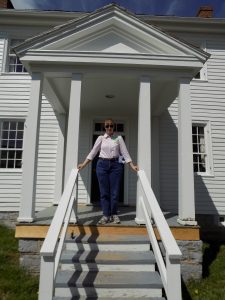A Historian Working In Retail

This past summer I took a part-time job as a cashier in a retail store. Yes, I’m still very involved with Emerging Civil War. No, I’m not quitting the history field. But it was time to take a steady job and be able to save for research trips or other long term goals without worrying about the bank accounts.
You know, work has those days occasionally, but overall it’s fascinating to briefly meet so many people and hopefully make their day a little better, a little happier. I thought you might find it rather amusing how history facts and lessons follow me to work. Hopefully, you’ll be inspired or encouraged to bring history to your own workplace, club, or community.
First, it’s the hardest thing to announce sales totals that are actually famous history dates. One time the sale total was $18.64 and you can’t imagine how I struggled not to say “and that was the year of the Battles of the Wilderness, Spotsylvania, New Market, North Anna, Cold Harbor, Petersburg, Atlanta, and The Burning.” And so my day flies by… “That will be $17.76, ma’am.” “19.45 is your total, sir.” “It’s just $10.66 today.” Between sorting the merchandise, greeting the customers, and bagging the items, I’m thinking through entire history lessons. Yikes!

Second, I read history books on my breaks. The first book I hid in my locker was Yankee Dutchman: The Life of Franz Sigel which I was re-reading for some Battle of New Market research. I couldn’t help wondering what my co-workers thought. As fascinating as Sigel is to study, he might look slightly disturbing to someone unfamiliar with 19th Century photography. (No one ever asked about that book…) Then, I hauled a six hundred pager of World War II history to the break room. David Hunter Strother’s journal made an appearance when I was taking notes. So far in three months, only one person has specifically asked what I’m reading…
Third, when coworkers figure out that I read a lot of history books, they get curious and then tell their own stories. “I’ve been to Gettysburg. Have you?” That prompted a great discussion about Gettysburg history and how it’s been such an important place to this co-worker’s family. Another time, I was beckoned to the art department to admire a print of George Washington kneeling in the snow. “I thought you’d like to see this because I know you read history.” It’s a chance to bring more history to the public and make the stories of the past more interesting when we discuss them over peanut butter sandwiches, surrounded by bulletin boards full of work schedules.
Fourth, I managed to keep it a secret for almost three months that I research, edit, and write, but this week it escaped in the break room that I was editing a manuscript. A history manuscript. It had almost been like a spy’s life – this sort of double-life. Working eight hours and just being “Sarah who’s standing at Register 7,” clocking out, and rushing home to my book ladened desk and half finished blog posts and manuscripts which had been abandoned in the morning’s rush to the job. We’ll see if the history questions and discussions become more common now that they know.
 Fifth, when you know many history stories, you start relating them to common scenes. There’s one typical scene that plays out at my cash register almost weekly. Brightly colored packages of candy sit temptingly at eye level for adults, children, and children in shopping carts. It’s a great marketing tool, but sometimes it creates a little drama. The child appeals to the parent or grandparent for candy and is politely refused. Then the little one turns to the cashier with a sweet smile and asks, “Can I have some?” probably assuming that the lady in the store uniform has unlimited powers over the candy display. Of course, I shake my head and support whatever the responsible adult had said. Every time that happens, I think of Henry Douglas’s story from Gettysburg. He had been wounded and left behind when the Confederates retreated, and there were some small children in the house were he stayed. As Douglas recalled, he soon gained popularity with the little ones and the children ran to “the big rebel” to try to get parental decisions overruled. (Does that sound like a recipe for household chaos?!)
Fifth, when you know many history stories, you start relating them to common scenes. There’s one typical scene that plays out at my cash register almost weekly. Brightly colored packages of candy sit temptingly at eye level for adults, children, and children in shopping carts. It’s a great marketing tool, but sometimes it creates a little drama. The child appeals to the parent or grandparent for candy and is politely refused. Then the little one turns to the cashier with a sweet smile and asks, “Can I have some?” probably assuming that the lady in the store uniform has unlimited powers over the candy display. Of course, I shake my head and support whatever the responsible adult had said. Every time that happens, I think of Henry Douglas’s story from Gettysburg. He had been wounded and left behind when the Confederates retreated, and there were some small children in the house were he stayed. As Douglas recalled, he soon gained popularity with the little ones and the children ran to “the big rebel” to try to get parental decisions overruled. (Does that sound like a recipe for household chaos?!)
Why did I choose to share these random stories? Three reasons:
- There’s always opportunity to talk about history without making people bored. Mostly just listen to their stories and add a little factual detail as you’re able. More people are interested in the past than ever before, they just don’t always know it!
- Maybe the stories will resonate with a reader who also has the struggle or delight of finding history in the little tasks of life – like reading off the sales totals.
- Hopefully, it will help another young historian or writer somewhere, someday to know that it’s okay and perfectly fine to work a job to “pay the bills” and still pursue those dreams of work in the history field. Be prepared for some late nights, but it is worth it!
I’m grateful for all the opportunities I have to research, write, edit, and build a business/career connected to the history field. I’m appreciatively of the editors at ECW who have trusted me to meet my deadlines even though it’s sometimes very late in the evening and thankful for the presentation coordinators at CWRTs and historical groups who are willing to work with my new schedule. Perhaps this isn’t exactly what I imagined I’d be doing this year, but I’m completely enjoying this season of life, working part time and meeting so many people who are interested in history…but don’t always know it until we start talking.
Whether you’re in school, working, or enjoying retirement, be brave and listen. There is a conversation about history and the past swirling around us, and sometimes we just have to step away from our desks, our books, and our computers to hear it and find how to add our voices and knowledge to the discussion.

If you complete your Ph.D. in History, you’ll then be qualified to drive a taxi.
Well, in CA you’re somewhat less likely to offend your customers’ sympathies (be they blue or gray) than if you were closer to the Ohio River or the Mason-Dixon Line!
Maybe one of these days, you’ll ring up $1220.60? lol
You might also try humming, “Richmond is a hard road to travel” while at your register! lol
Entertaining reading ; if only you were a trust-fund beneficiary eh?
Hey – I’m not complaining. Perhaps earning a wage makes life more exciting or at least busy? 🙂
Busy, yes; Exciting, NO! lol
I appreciate your attitude and approach to sharing history with people and in many instances it will inspire others to dig a little deeper. And, as much as I dislike adding a somewhat negative tone to this it reminds me of how often I see folks eyes glaze over when history is brought into the conversation. I also think that our approach in respect to education curriculum short changes history and in some instances is revising it to fit someone’s political beliefs. All the more reason to applaud your upbeat approach – a fun and informative introduction to history. Hopefully many of the children reaching for a candy bar today will be reaching for a history book tomorrow, thanks to you!
Good points, Dale. I think one of the things I’m enjoying is letting people approach and engage history on their own terms. I don’t mean letting believe something that’s wrong, but letting them “come to the table” with their experiences and ideas and being willing to listen and engage in conversation. That maybe be difficult to achieve in a classroom, but it has been working wonderfully well in my attempts outside the school arena and less-academic settings.
All those years of teaching math to mostly disinterested 7th graders, all the while thinking, “I coulda been a contender!”
I like to ask any time I handle money (banks, shopping, etc.) who is the person on the paper currency, and why ae they there? Who is a president and who is not? Why is a person who is not a president on the currency. Has the person who gives or receives a ten ever her about the play “Hamilton?’ Who was the first postmaster general on the few occasions that a C note changes hands? Why did Grant become president? People seem to be truly interested; I doubt that all are just being polite.
Please correct me if I am wrong. Didn’t the Federal monetary system start during the Lincoln administration with S. P. Chase (Chase Manhattan Bank)?
Sorry, Chase Bank was named after him but he was never associated with it. Chase National Bank was founded in 1877 by John Thompson.